About the Dean's Forum
Engages justice community stakeholders in Saskatchewan in a dialogue about access to justice and the future of the justice system
The Dean’s Forum course, unique to the College of Law, offers law students an opportunity to contribute to justice policy alongside community stakeholders, who are leading members of the legal profession
First meeting of the Dean's Forum was in 2013
March 2025 marked the most recent meeting of the Dean's Forum
Responding to national calls to improve access to justice
Dean’s Forum students ground their work in the touchstone report of the National Action Committee on Access to Justice, Access to Civil and Family Justice: A Roadmap for Change 2013 (A Roadmap for Change), chaired by the Honourable Mr. Justice Cromwell of the Supreme Court of Canada, and the recommendations from the Canadian Bar Association’s Reaching Equal Justice Report (downloadable below). The students prepare literature reviews, look to initiatives that are happening across Canada and internationally, and conduct consultation interviews with key stakeholders within the province on each topic to further inform and focus their work in the Saskatchewan context. Each group prepares a policy discussion paper summarizing their research and identifying key ideas, themes, and points for further discussion. The students also have an integral role in the development and planning of the Dean’s Forum meeting day.
The Dean’s Forum initiative facilitates an environment for raising access to justice consciousness and related action among and between all participants.
Our Dean’s Forum students benefit from:
- Learning about access to justice in the local, provincial, national contexts, and beyond
- Reaping experiential benefits and developing reflective practice skills
- Gaining tools intended to help facilitate transformational change in improving access to justice
Our Dean’s Forum students have reflected on the benefits of their experience as key participants in the initiative:
“The most important learning moment was realizing who the gaps in legal services actually affected. I had worked at CLASSIC and seen some lower income groups come in. I was aware of the concept of legal aid, and those below a certain income bracket qualifying for that. However, I had never viewed this as a ‘middle class’ problem. I never considered that it would be members of my family or people I grew up with. I had never contextualized what legal fees would be compared to what the average family makes. That was an important moment for me, because it put the whole project in perspective. It has a direct impact on my life and the people in it. It is hard to dismiss a social issue such as that when it is literally staring you in the face.”
“I really enjoyed the experiential activity and view it as a very rewarding experience because I was a part of something meaningful, gained exposure to new experiences, built confidence within myself, and contributed to something that may have a huge impact on both the legal profession and peoples’ lives.”
“Participating in this class was one of the most rewarding experiences of my life, and I am so grateful that I had the opportunity to be a part of a discussion addressing access to justice issues. This class has helped me realize that I can use my legal education and my position to help make changes for the better. I know I sound extremely optimistic, but as [the instructor] said, this ignorant optimism may just be what is needed.”
These are examples of Dean’s Forum outreach in the community, including conferences attended, presentations made, and contributions of materials.
- Presenter, Alternative Dispute Resolution Institute of Saskatchewan Inc. Annual General Meeting, Saskatoon, Saskatchewan (April 2017)
- Presenter, Canadian Association of Law Teachers Conference, Calgary, Alberta (May 2016)
- Attendee, Saskatchewan Administrative Tribunals Association Annual General Meeting and Conference: “Access to Justice: Moving Forward - Stepping up the Action”, Regina, Saskatchewan (May 2016)
- Presenter, Alternative Dispute Resolution Institute of Saskatchewan Inc. Annual General Meeting and Conference: "Innovation in Conflict Resolution in Saskatchewan: Defining the Next Chapter”, Saskatoon, Saskatchewan (May 2016)
- Presenter, Meeting of Ministry of Justice Leadership Team, Regina, Saskatchewan (April 2016)
-
Presenter, Meeting of Dean’s Advisory Council, College of Law, University of Saskatchewan (March 2016)
- Contributor, CBA Legal Futures Workshop: “Transforming Legal Education and Training in Canada: Learning Across Life Stages”, Canadian Bar Association, Toronto, Ontario (March 2016)
- Contributed to materials on civil process reform and judicial mediation, Mediation Seminar, Federal Court of Canada (January 2016)
- Presenter, Meeting of Saskatchewan Access to Justice Working Group, Saskatoon, Saskatchewan (January 2016)
- Student Group Meeting with the Honourable Mr. Justice Brown, Supreme Court of Canada, Meeting on “Accessibility of Superior Courts and Court Procedures”, Saskatoon, Saskatchewan (February 2016)
- Student Group Meeting with the Honourable Mr. Justice Winkler, Former Chief Justice of Ontario, Meeting on “Accessibility of Superior Courts and Court Procedures”, Saskatoon, Saskatchewan (January 2016)
- Student Group Conveners, Community Roundtable with Community Based Organizations, Meeting on “Putting the Public First”, Saskatoon, Saskatchewan (January 2016)
- Presenter, Session of Mediation Class, College of Law, University of Saskatchewan (November 2015)
- Presenter, Meeting of Access to Legal Services Committee, Law Society of Saskatchewan, Saskatoon, Saskatchewan (2015)
- Presenter, Meeting of Faculty Council, College of Law, University of Saskatchewan (November 2015)
- Contributed memorandum on the Dean’s Forum to the Saskatchewan Court of Queen’s Bench (November 2015)
- Attendee, CIAJ Aboriginal Peoples and Law Conference: “We are All Here to Stay", Saskatoon, Saskatchewan (October 2015)
- Attendee, Innovation and Access to Justice Conference, Montreal, Quebec (October 2015)
- Presenter, “Creating a collaborative policy-making course on access to justice”, 6th Annual Association of Canadian Clinical Legal Education Conference: “The Place of Clinical Legal Education”, Saskatoon, Saskatchewan (October 2015)
- Presenter, Meeting of Dean’s Advisory Council, College of Law, University of Saskatchewan (March 2015)
Meetings of the Dean's Forum
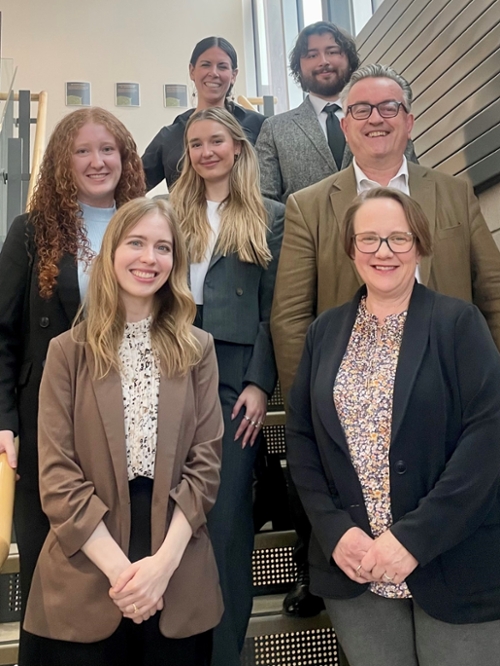
The 13th annual meeting of the Dean’s Forum on Access to Justice and Dispute Resolution (Dean’s Forum) occurred on March 12, 2025, at the University of Saskatchewan College of Law.
For 2025, the Dean’s Forum focused on continuous improvement in the family justice system, from both an upstream (Topic 1) and a downstream (Topic 2) approach.
Students were split into two groups to examine these two interconnected topics, from the perspective of public legal education and well-being for users of the system.
Topic 1, Before You Live Together, Read This... focused on best practices for creating public legal education for teens about legal rights and responsibilities related to family law and healthy relationships.
Topic 2, Before You Separate, Read This... focused on how principles of good legal design can be utilized to create a process map of the family justice system for self-represented litigants.
Both groups conducted in-depth research into their respective topics and consulted with numerous stakeholders in the access to justice and family law communities in Saskatchewan to inform their policy paper and resource.
The meeting day was divided into two sessions – Topic 1 in the morning and Topic 2 in the afternoon. Each session included a presentation of background research and an introduction of a resource. This was followed by small group activities/discussion and large group debrief. The day wrapped up with enthusiastic discussion about possibilities for future development and implementation of the resources by various stakeholders.
Following the Dean’s Forum Day, both groups created follow-up reports. These reports summarized their projects, key discussion themes and takeaways from the day, and hopes for continued development and implementation of their respective resources.
Policy discussion papers and follow-up reports:
Topic 1: Follow-up Report and Summary Notes: Before You Live Together
Topic 2: Follow-up Report and Summary Notes: Before You Separate
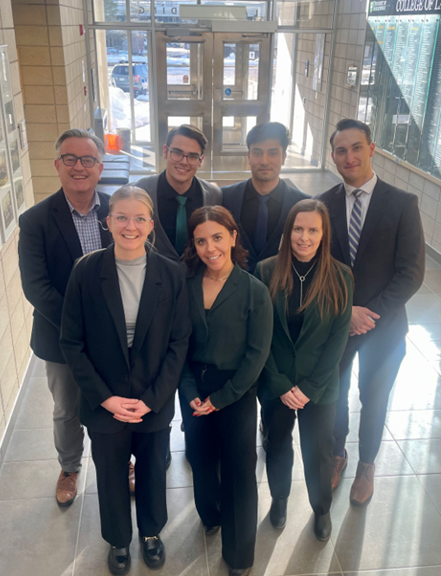
March 11, 2024 saw the 12th annual meeting of the Dean’s Forum on Access to Justice and Dispute Resolution regarding the usage of Generative Artificial Intelligence (AI) software’s potential uses for the improvement of Access to Justice in Saskatchewan.
The 12th meeting day was split into two presentations from two different groups. Group 1 dealt with how this technology may be used by the public to better meet their legal obligations. Group 2 focussed on how legal service providers and legal information providers could become more efficient in their work to better make use of their time and financial resources. This project is meant to serve as a starting point for future Dean’s Forum meetings to develop these ideas and present a more sophisticated solution to the complicated AI landscape.
The presentation materials were created by numerous consultations with legal community stakeholders in Saskatchewan and abroad. The students also consulted recent studies and articles about both the function of AI and how public and private bodies have responded to its explosive rise. Many of those same stakeholders attended the meeting and further contributed to discussion and development of these ideas.
The meeting day itself proceeded with presentations from the two groups coupled with exercises made to engage the attendees and give them hands-on practice with AI technology. The 2024 team produced “MartinAI” which was an AI assistant using a base AI model of ChatGPT 3.5 that aided in answering questions and legal exercises throughout the day.
The 2024 team hopes to continue their involvement in assisting Saskatchewan’s AI integration with the help of various stakeholder groups. They are optimistic about how this new force will be of benefit to Saskatchewan and Canadians across the country.
Figure 1: Group Picture (from left to right, back: Dean Martin Phillipson and Dean’s Forum students Griffin Moody, Hassan Sajjad, Sam Riendeau; and front: Hannah Jorgenson, Laura Olsen, and Lisa Wanlin. Photo credit/missing: Brea Lowenberger (Dean’s Forum Course Instructor & Program Facilitator).
Policy discussion papers and follow-up reports:
- Handbook for the public on usages, benefits, and risks of using GenAI to navigate a legal process
- Accompanying report for stakeholders on GenAI & Access to Justice
- Follow-Up Report & Summary Notes on Handbook for the public (2024 Summary Notes)
- Handbook and follow-up report for legal information and service providers on ways in which such providers can implement GenAI into their practice, reducing the providers’ time while enhancing client engagement
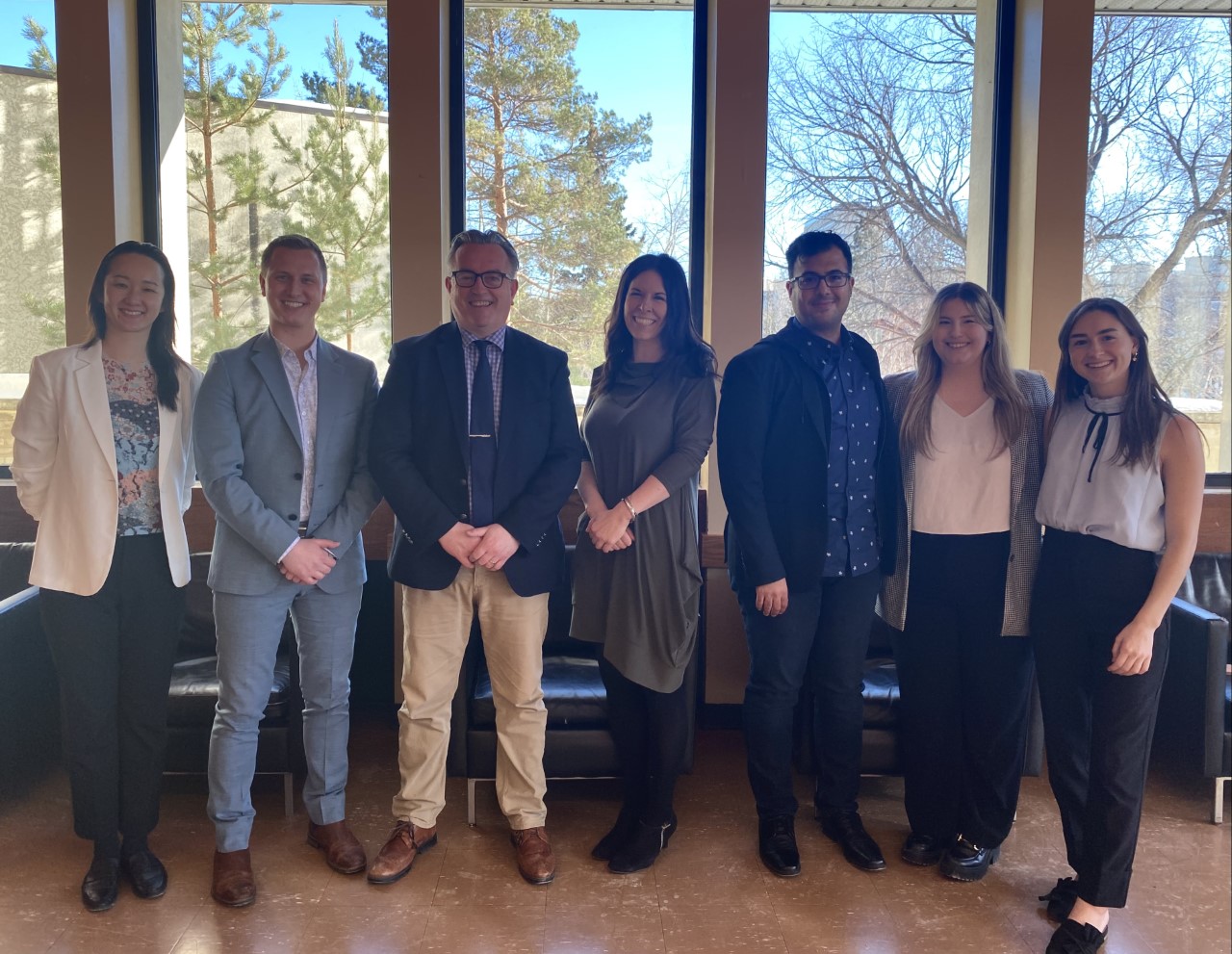
The eleventh annual meeting of the Dean's Forum on Access to Justice and Dispute Resolution (the “Dean’s Forum”) took place on March 3, 2023, at the University of Saskatchewan.The 2023 Dean’s Forum aimed to continue the conversation on how to create an effective family law system: one that provides justice, access, and fairness in a cost-conscious and efficient manner. The Forum examined two interconnected topics: (1) methods for reaching adjudicated family law resolutions; and (2) the models used to educate those who practice family law. These topics built off previous Dean’s Forum work on improving Saskatchewan’s family court system (see, e.g., 2016, 2020, and 2021 topic papers), education (see, e.g., 2015 topic paper), and rural access to legal services (see, e.g., 2018 topic paper) and pick up on the national legal education conversation (see, e.g., the 2022 Conference On Re-envisioning Legal Education Across The Continuum In Canada).The students researched and consulted various stakeholders to develop policy discussion papers on their topics for stakeholders’ consideration leading up to the Forum. During Forum Day, students presented on family law competency education through an interactive workbook, followed by a presentation on six family justice adjudicative models. In breakout groups, participants evaluated all five adjudicative models against the three principles that were identified at the consultation and research stage: expediency, cost-efficiency, and holistic decision making. The breakout session for the competencies team focused on the development of a competency framework, pilot project, or competency consultant description under a scenario context that was unique to each breakout group.After the two rounds of discussions on the topics, a large group discussion was facilitated by asking attendees to share what they will personally take away from the Forum. The day ended by inviting attendees to fill out a feedback form, followed by closing remarks provided by Dean Phillipson and Brea Lowenberger.Since Forum Day, each student group finalized a follow-up report, including considerations for next steps to advance the topics, and a number of attendees have expressed an interest in contributing to or leading some of those next steps.
Figure 1: Group Picture (from left to right: Tiffany Xu, Jakaeden Frizzell, Dean Martin Phillipson, Brea Lowenberger (Instructor), Sam Rezezedah, Stephanie Varsanyi, & Megan Ripplinger)
Policy discussion papers and follow-up reports:
The 10th annual meeting of the Dean's Forum on Access to Justice and Dispute Resolution (the “Dean’s Forum”) took place on March 10, 2022, at the University of Saskatchewan.
This year, the Dean’s Forum dealt with the transition of court matters to virtual facilitation during the COVID-19 pandemic. The students consulted various stakeholders who were at the forefront of using technology in justice processes and presented a summary of stakeholder experiences at the Court of Appeal, the Court of Queen’s Bench, the Provincial Court, and in mediations and tribunals. Additionally, the students proposed a preliminary framework that decision-makers could employ to predict the effectiveness of resolving a legal matter with the assistance of technology.
During the event, the Dean’s Forum students presented their findings and invited attendees to apply the framework presented in their policy paper to scenarios and report back on the efficacy, challenges, and opportunities of the virtual facilitation predictive framework.
After the event, the students finalized a follow-up report, including ideas for next steps. Since the Dean’s Forum concluded, several participants have expressed interest using the framework to make decisions at their organizations.
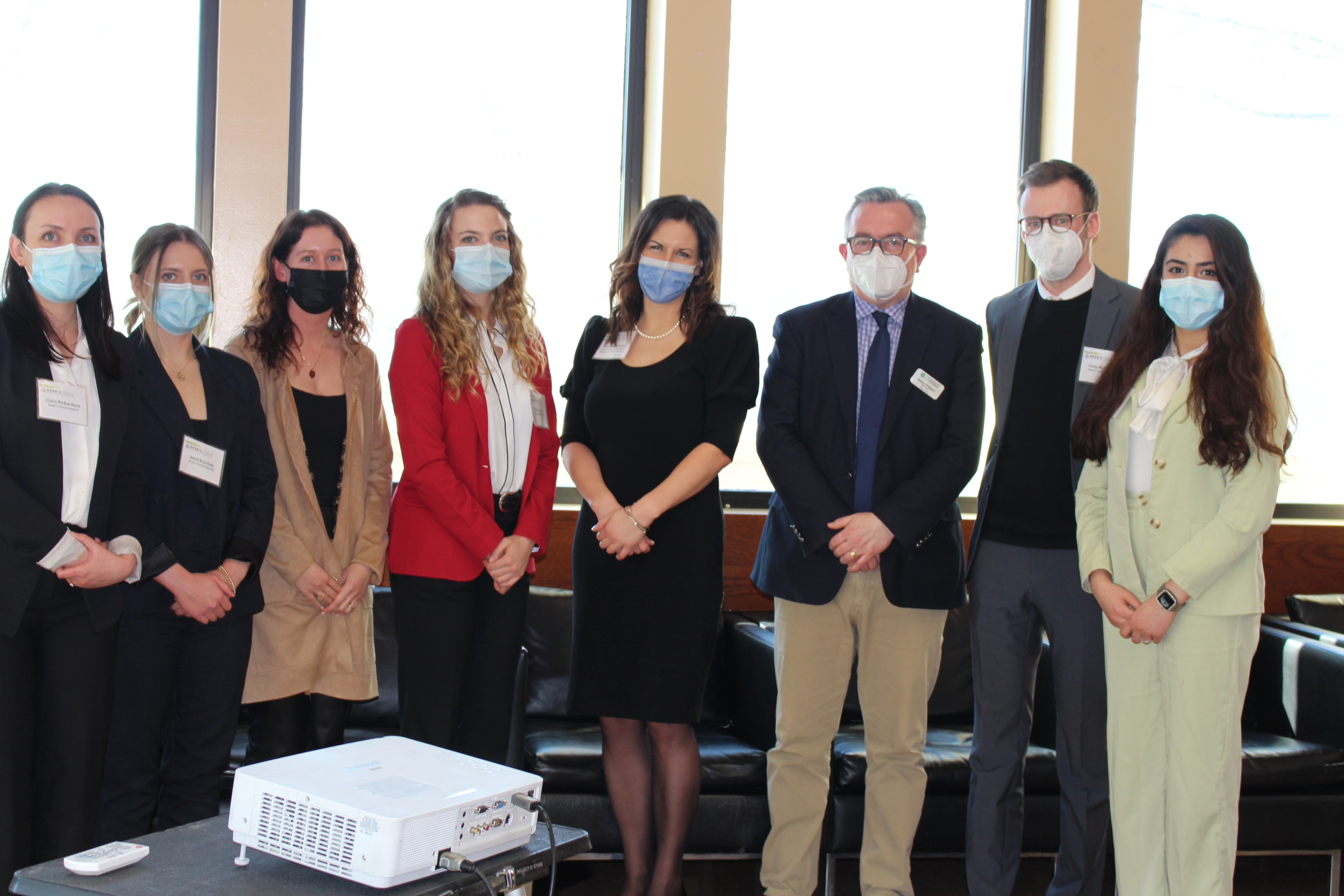
Dean’s Forum Students and Faculty (from left): Ciara Richardson, Reed Boychuk, Stephanie Pankiw, Tasia Presber, Brea Lowenberger, Dean Martin Phillipson, Liam McDonald & Robeah Saee
Policy discussion papers and follow-up reports:
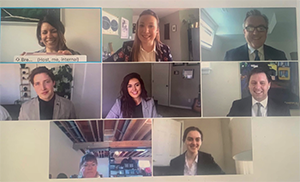 The 9th meeting of the Dean's Forum on Access to Justice and Dispute Resolution (the “Dean’s Forum”) was split into two half-days (March 5 and 9) and for the first time, was held online.
The 9th meeting of the Dean's Forum on Access to Justice and Dispute Resolution (the “Dean’s Forum”) was split into two half-days (March 5 and 9) and for the first time, was held online.
This year, the Dean’s Forum student groups had very different topics. One group, the “Family Group” was tasked with exploring and investigating mandatory independent legal advice (ILA) in the family justice system – a problem that arises within a complex system. In essence, the Family Group was asked to address a very complex problem.
In contrast, the second group, the “Lab Group” was asked to explore and examine technology or innovation labs. As organizations, Labs are ultimately defined by a particular process – a process which is designed to devise innovative solutions to address problems within complex systems. In short, the Family Group was asked to address a complex problem, while the Lab group was asked to examine a process which yields solutions to complex problems.
The merging of topics became a natural progression for the purpose of the Dean’s Forum presentation. Each day of the Dean’s Forum addressed different stages of the lab process and was intended to lead participants to understand, brainstorm, and eventually develop solutions for the ILA problem.
The students finalized a follow-up report, including ideas for next steps, and an accompanying feedback form, which was circulated with all participants.
The results of the feedback form indicated that a number of participants have expressed an interest in being part of a working group to further examine and advance the ILA topic. As well, stemming from the work done at this year’s forum, CREATE Justice intends to explore the viability of a lab that could be implemented with the aim of addressing problems that relate to access to justice.
Policy discussion papers and follow-up reports:
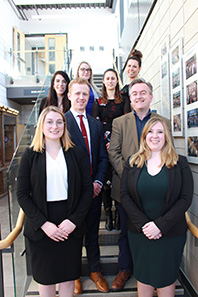 The Dean’s Forum on Access to Justice and Dispute Resolution (“Dean’s Forum”), held on March 10, 2020, focused on two initiatives: (1) The Design Lab for Creating Limited Licence Practitioner Pilot Projects; and (2) Next Steps in Exploring Family Justice in Saskatchewan. Again, this year, students implemented innovative approaches to invite attendees to collaboratively and creatively tackle the topics leading up to and at the event, as described in the below follow-up reports.
The Dean’s Forum on Access to Justice and Dispute Resolution (“Dean’s Forum”), held on March 10, 2020, focused on two initiatives: (1) The Design Lab for Creating Limited Licence Practitioner Pilot Projects; and (2) Next Steps in Exploring Family Justice in Saskatchewan. Again, this year, students implemented innovative approaches to invite attendees to collaboratively and creatively tackle the topics leading up to and at the event, as described in the below follow-up reports.
1. The Design Lab for Creating Limited Licence Practitioner Pilot Projects
The student researchers, Elaine Selensky, Haley Stearns, and Everhett Zoerb, authored a policy discussion paper that offers solutions for efficiently designing and implementing a new framework for limited legal service providers in Saskatchewan. More specifically, the students’ paper balances innovation with risk mitigation by suggesting a “regulatory sandbox” approach. It recommends continuous needs-assessment and evaluation through the lens of the Access to Justice Measurement Framework created by Access to Justice BC. The policy paper also outlines three potential pilot projects, developed with input from consultees, that could serve as starting points for a regulatory sandbox initiative.
During Dean’s Forum day, the student researchers facilitated a Design Lab, which involved key stakeholders with a range of perspectives and expertise. These stakeholders reviewed the student researchers’ policy paper, attended the morning presentation, contributed to an “idea wall,” and participated in “breakout sessions.”
The student researchers’ follow-up report outlines common themes from the Design Lab and recommendations for next steps. For more information, read these reports:
- The Design Lab for Creating Limited Licence Practitioner Pilot Projects (student policy discussion paper)
- Follow-Up Report & Summary Notes on The Design Lab for Creating Limited Licence Practitioner Pilot Projects (2020 Summary Notes)
2. Next Steps in Exploring Family Justice in Saskatchewan
The policy discussion paper authored by student researchers, Melissa Nelson, Jenine Urquhart, and Miranda Wardman considered, primarily, the gap in access to justice surrounding family court forms in Saskatchewan. The key focus was Saskatchewan’s current Financial Statement form. The policy discussion paper delved into complexities of the Financial Statement form to understand: 1) the user perspective when filling out the Financial Statement form, and 2) how to redesign the Financial Statement form to make it easier for a typical self-represented litigant (SRL) to use. The student researchers’ policy paper highlighted the findings from the user design thinking sessions they ran with both professionals and students. After such sessions and consultations, the students provided a recommendation for a new Financial Statement form and redesigned a form based on Nova Scotia’s form. The students workshopped their redesigned form with Saskatchewan’s SRL Working Group before publishing and presenting it to Forum attendees.
After presenting their findings to Forum attendees, the student researchers split the attendees into groups, and supplied them with a copy of the redesigned Financial Statement form. Attendees were asked to fill the form out from their own perspective, followed by being provided an SRL scenario and being asked to fill out with their group a new redesigned form as the SRL.
The student researchers’ follow-up report outlines common themes from the day and recommendations for next steps. For more information, read these reports:
- Next Steps in Exploring Family Justice in Saskatchewan (student policy discussion paper)
- Follow-Up Report & Summary Notes on Next Steps in Exploring Family Justice in Saskatchewan (2020 Summary Notes)
As stated above, stakeholders this year contributed to an “idea wall”. Melissa Craig and Allyse Cruise, participants in last year’s forum (2019), were happy to be invited back to run an “idea wall” at this year’s forum. The purpose of the wall was to consider this year’s topics through the lens of last year’s focal point: technology. The Dean’s Forum is a continuous thread. A throughline exists from one year to the next. Read more about the findings of the “idea wall”, and the interconnectedness between Dean’s Forum topics in the report below:
The report also collates reflections and feedback from the 2020 Dean’s Forum students and attendees. Students were invited to respond to a set of reflective questions and attendees were invited to fill out a feedback form following the Dean’s Forum. The reflections and feedback from students and attendees could help to inform future iterations of the Dean’s Forum initiative.
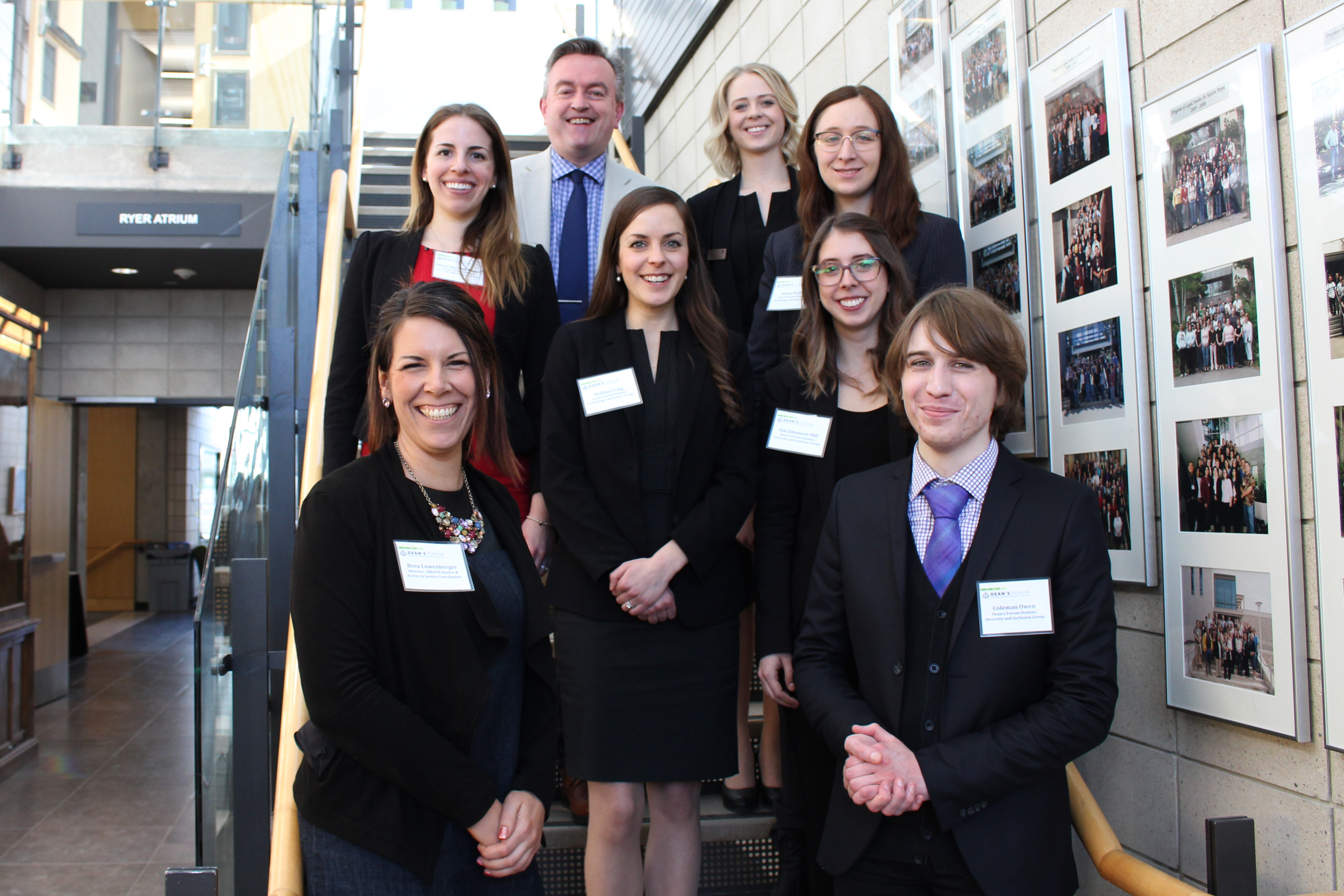 The seventh meeting of the Dean's Forum was held on March 13, 2019. Forum participants addressed two topics: “Diversity and Inclusion in the Legal Profession” and “Meeting Saskatchewan’s Justice Needs With Technology”.
The seventh meeting of the Dean's Forum was held on March 13, 2019. Forum participants addressed two topics: “Diversity and Inclusion in the Legal Profession” and “Meeting Saskatchewan’s Justice Needs With Technology”.
NEW this year - Students implemented innovative approaches to invite attendees to collaboratively and creatively tackle the topics at the event, including Transformative Scenario Planning and design thinking and process mapping, as described in the below follow-up reports.
1. Diversity and Inclusion in the Legal Profession
In the morning, upper-year law students Zoe Johansen-Hill, Larissa Meredith-Flister, and Coleman Owen presented their policy discussion paper on “Diversity and Inclusion in the Legal Profession” to provide participants with context for the discussions that followed. Participants were then divided into groups to engage in a breakout session focused on diversity and inclusion at private law firms in Saskatchewan. Each breakout group was presented one of four fictional scenarios. The breakout sessions were based on the adaptive and transformative stances presented in Transformative Scenario Planning, by Adam Kahane. Following the breakout sessions, participants reconvened to report back about the themes from the small group sessions and work toward building consensus around next steps. The common themes that emerged from discussion included:
- the role of education for law students and lawyers on themes including bias, leadership, and cultural competence;
- that diversity and inclusion must be seen as core components of professionalism;
- that leaders must create an environment in which people are safe and can flourish;
- the importance of having support groups that are championed by the leadership of the organization;
- that baseline data is necessary to estimate where the legal profession in Saskatchewan is headed; and
- that celebrating positive steps taken by organizations and individuals is an important way to build momentum moving forward.
In response to these themes, the students created a syllabus on diversity and inclusion containing modules which could be extracted and incorporated into law courses, as well as educational sessions for lawyers. Here are the reports:
- Diversity and Inclusion in the Legal Profession (student policy discussion paper)
- Follow-Up Report & Summary Notes on Diversity and Inclusion in the Legal Profession (2019 Summary Notes)
2. Meeting Saskatchewan’s Justice Needs With Technology
The afternoon session of the Dean’s Forum focused on the topic of “Meeting Saskatchewan’s Justice Needs With Technology”. The afternoon was structured by upper-year law students Melissa Craig, Allyse Cruise, Jianna Reider so that the Dean’s Forum attendees were part of a hypothetical 'think tank', tasked with ideating how to use technology to improve the legal empowerment of the public. The attendees were introduced to the 'think tank' by being asked to consider how to strengthen the public’s access to credible and centralized legal information online in a matter that would improve the public’s capacity to exercise their legal rights and responsibilities. The think tank concept was premised on the recognition of the work that has already been done in the province through organizations such as PLEA and Sask211. The attendees were given a brief description of the current ecosystem in Saskatchewan and the current state of legal technology in other jurisdictions, as well as an introduction to design thinking and process mapping. Following the introduction, the think tank was divided into breakout groups. Each group was tasked with a different legal problem and were asked to map out the steps that a client would go through in order to resolve their legal problem. At this stage, the think tank was asked to identify any ‘pain points’ that a user might experience in trying to resolve their legal issue. Following this breakout session, the think tank once again broke out into groups to develop solutions or “ideate” surrounding these pain points. The think tank then gathered to report back on their conversations and talk about next steps. A discussion surrounding risk analyses and kaizen was also explored. The below follow-up report outlines the important insights drawn from the discussions. The think tank found that it is in the public interest that the legal community embrace technology and in order for the legal community to do this effectively, the community needs to adopt a “start-up” mentality.This involves embracing the client-centred approach to creative problem solving and empathizing with the client. The think tank ended on a positive note with commitments from several participants to embrace technology and move forward with project development to meet the justice needs of Saskatchewan. For more information, read these reports:
- Meeting Saskatchewan’s Justice Needs With Technology (student policy discussion paper)
- Follow-Up Report & Summary Notes on Meeting Saskatchewan’s Justice Needs With Technology (2019 Summary Notes)
NEW this year - Student and attendee reflections were collated into a report. Students were invited to respond to a set of reflective questions and attendees were invited to fill out an evaluation form following the Dean’s Forum. The reflections and feedback from students and attendees could help to inform future iterations of the Dean’s Forum initiative.
Follow-Up Report: Student and Attendee Reflections on Dean’s Forum (2019 Reflections)
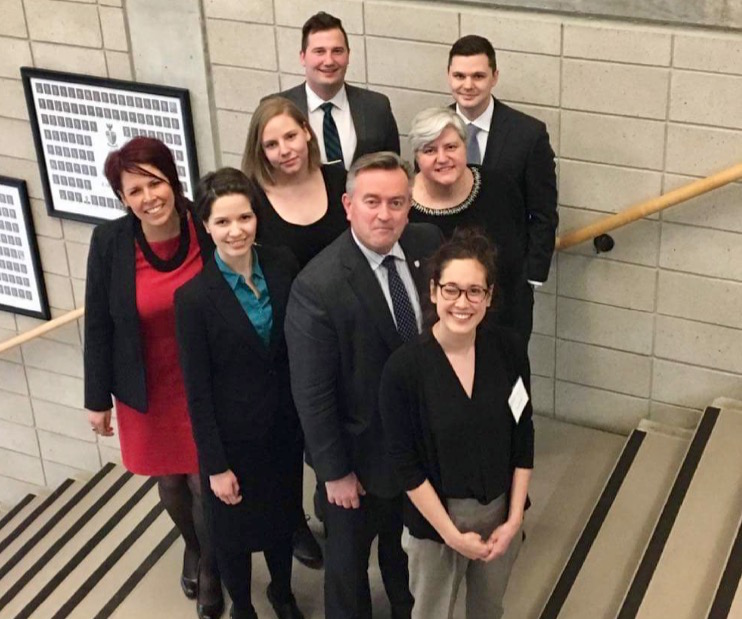
In the morning, Dean’s Forum participants discussed the issue of access to civil and family legal services in rural Saskatchewan. Participants considered whether – within the context of a dispersed population, limited availability of legal services in rural and remote communities, and a trend towards increasing rates of rural lawyers reaching retirement age – there is a viable approach or legal service delivery model that could be designed to meet the civil and family legal services needs of those who do not reside in urban centres in Saskatchewan. The Legal Incubator Model emerged as one legal services delivery model which could potentially, with further research and consultation, be designed to specifically meet the civil and family legal services needs of those who live in rural and remote areas in Saskatchewan.
In the afternoon, participants engaged with the question of how do we measure the extent to which the system, broadly conceived, facilitates access to civil and family justice, and what a justice metrics framework could look like in Saskatchewan. Drawing from work by other jurisdictions and considering unique local needs, participants started to discuss what metrics should be tracked to evaluate progress and the impact of interventions intended to improve the system. The topic of justice metrics will continue to be discussed, studied, and operationalized through, for example, two new CREATE Justice related initiatives: provincially though the “Justice Sector Data Inventory, Evaluation, and Toolkit” and nationally through the “Action Committee Metrics Working Group”.
Improving Access to Civil and Family Services in Rural Saskatchewan (student policy discussion paper)
Civil and Family Justice Metrics: Towards a Framework for Saskatchewan (student policy discussion paper)
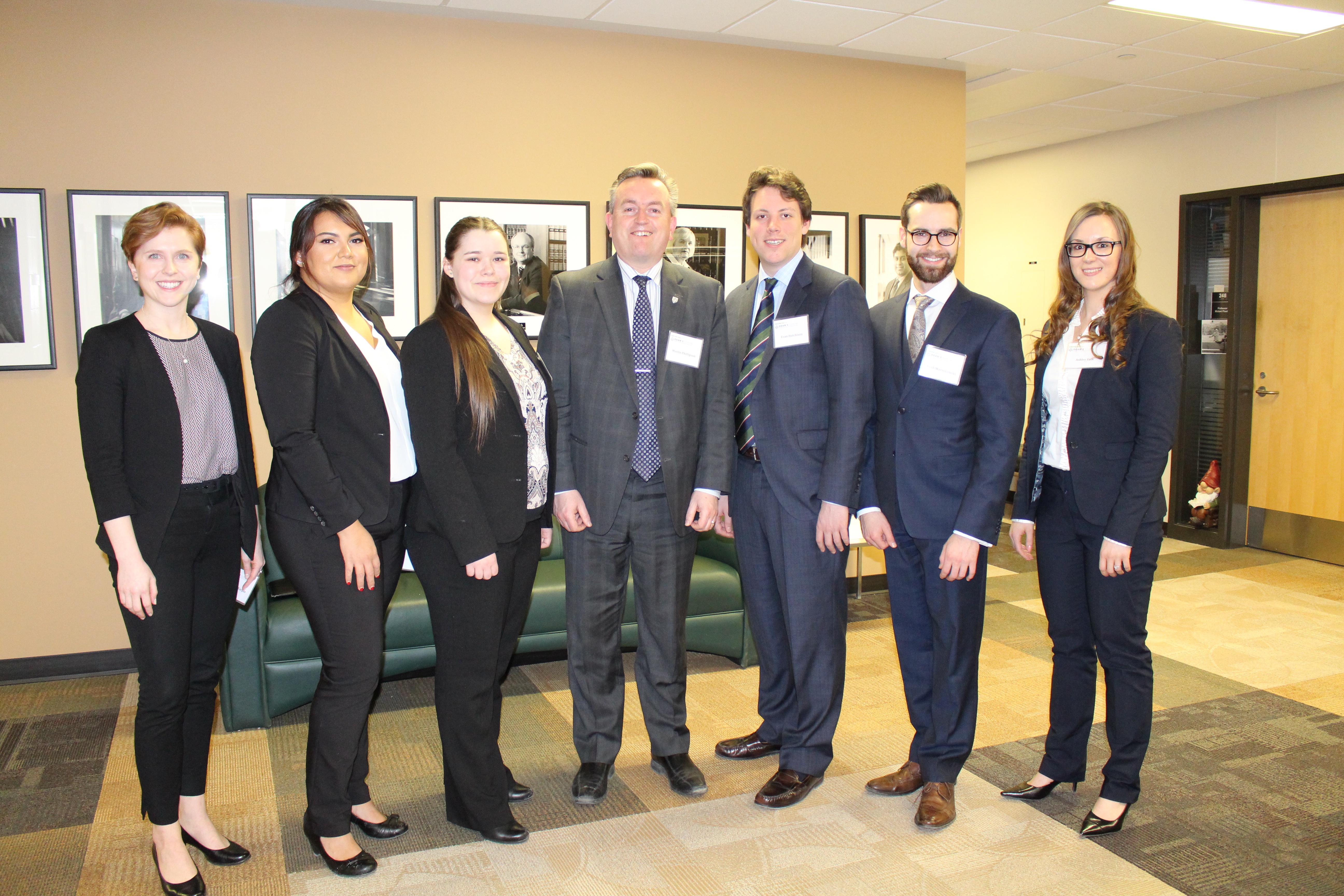
The first topic explored how the distinction between legal information and legal advice has been defined in various contexts, including intermediaries (e.g. librarians), legal coaches, and near-to-law professionals. The purpose of the topic was to, through these case studies, identify the cost/benefit of the distinction being at various points along a spectrum of more protectionist to more open, and work towards identifying a principled approach to setting the appropriate distinction, guided by the best interest of the public.
The second topic examined how partnerships between justice and health systems might improve access to justice for the public in urban, rural, and remote areas of Saskatchewan, with a special focus on how technology might enhance this service provision. The goal of this topic was to identify infrastructures, innovations, services, and resources currently available for the provision of health services and determine whether there are opportunities, partnerships, and relationships that could be developed to better enable the provision of justice services, improve access to information, and save costs.
Legal Information, Legal Advice, and Access to Justice (student policy discussion paper)
A summary of the progress made in implementing recommendations from previous Dean’s Forums can be viewed here: 2016-17 Dean’s Forum progress report and summary notes.
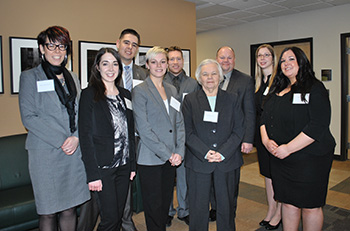 The fourth meeting of the Forum took place in February 2016. Student groups again prepared policy discussion papers and presentations. The students focused on two themes: (1) putting the public first in access to justice initiatives; and (2) the accessibility of superior courts and court procedures.
The fourth meeting of the Forum took place in February 2016. Student groups again prepared policy discussion papers and presentations. The students focused on two themes: (1) putting the public first in access to justice initiatives; and (2) the accessibility of superior courts and court procedures.
The goal for the first topic was to engage Dean’s Forum participants in a discussion to explore and critically engage with identifying who 'the public' is and how it can contribute meaningfully to more 'accessible justice'. The students shared with participants the scope of their project, which involved building upon previous work completed through the Dean’s Forum initiative to ‘map’ justice services for the purposes of: reciprocal learning; identifying critical gaps in legal information and service providers; and empowering the community. The second topic examined how Courts and Court procedures can be more accessible to more people and more cases, reflective of the needs of the society it serves. This theme involved examining how early and active judicial case management and dispute resolution, and further engaging lawyers in the new simplified and summary procedures rules of Court could improve access to justice for Saskatchewan residents.
Putting the Public First (student policy discussion paper)
"Action" to Justice: Addressing Access to Justice in the Saskatchewan Court of Queen's Bench (student policy discussion paper)
Photo: Front row: Dean’s Forum Instructor and Access to Justice Coordinator Brea Lowenberger, Janelle Souter, Julia Quigley, College of Law Dean Beth Bilson, Kelsey Corrigan. Back row: Lorne Fagnan, Graham Sharpe, Saskatchewan Deputy Minister of Justice and Attorney General Kevin Fenwick, Sarah Nordin.
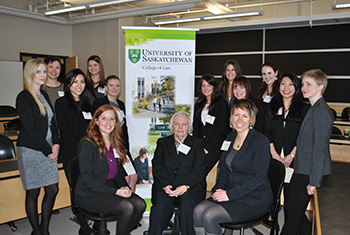
Since the last Dean’s Forum in March 2015, Forum participants’ recommendations to move toward creating a staff Access to Justice Coordinator position, and an action and advisory oriented Saskatchewan Access to Justice Working Group have been fulfilled. During Spring and Summer 2015, the College of Law, in collaboration with the Ministry of Justice, applied for and received funding from the Law Foundation, with support from the College of Law, to create an “Access to Justice Coordinator” position on a three-year term.
In addition to establishing an Access to Justice Coordinator position, during Summer 2015, the Ministry of Justice, Justice Innovation Division began drafting the Saskatchewan Access to Justice Working Group mandate and membership list in accordance with Dean’s Forum members’ recommendations to create same.
Brea Lowenberger was hired as the Access to Justice Coordinator for the Saskatchewan Access to Justice Working Group and started in the position on October 1, 2015. Ms. Lowenberger has been supporting the creation of the Working Group and the implementation of and evolution of Dean’s Forum topics, as well as connecting with justice community stakeholders, students, and the community at large on initiatives that promote justice reform and access to justice.
Preparation for the first meeting of the Saskatchewan Access to Justice Working Group occurred during Fall 2015. The first meeting of the Working Group was a full day event on January 5, 2016 at the College of Law.
2015-16 Dean’s Forum progress report and summary notes
Photo: Students in the Dean's Forum course pose with instructors Brea Lowenberger (front right) and Janelle Anderson (front left) and Interim Dean Beth Bilson (front centre).
The third meeting of the Forum took place in March 2015. Student groups again prepared policy discussion papers and presentations. The students focused on two themes: (1) the role of non-lawyer legal professionals (legal technicians/paralegals) in the delivery of legal services (a subset of the early integrated intervention and public information at critical gaps theme); and (2) how law school can better prepare students to appreciate and respond to the access to justice issue, including possibly introducing a Centre of Excellence for Access to Justice at the College of Law (a subset of the original culture shift of the legal profession theme).
The Forum participants supported the general idea of introducing paralegals/legal technicians into the Saskatchewan market with the aim of providing more accessible and affordable justice. There was also support that law school admissions, curricular and extra curricular programming, and degree requirements be re-examined by the College with an access to justice lens. Forum members further identified the need for infrastructure to provide ongoing support for Dean’s Forum meetings and recommendations arising from the meetings, by creating (i) an action-oriented provincial access to justice committee “Working Group” as a smaller extension of the Dean’s Forum whose members meet on a regular basis and ensure that Dean’s Forum recommendations are proceeding; and (ii) a staff position to help coordinate the Dean’s Forum event, Working Group meetings and initiatives, and projects arising from the same.
Access to Justice: A Legal Education Initiative (student policy discussion paper)
A Discussion Paper on Introducing Paralegals into the Saskatchewan Legal Market (student policy discussion paper)
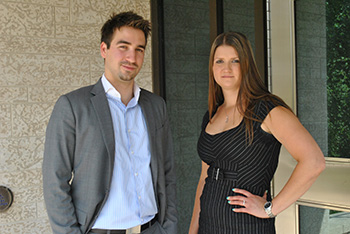 With support from the Ministry of Justice, the College of Law created two “Dean’s Forum” summer positions, for University of Saskatchewan law students, to engage in follow-up work during summer 2014. Two students from the previous Forum student groups filled these positions and and reported to a Forum sub-committee. The two students spent the summer months continuing to explore the topics of early and integrated service delivery and the evolution of Saskatchewan’s legal culture.
With support from the Ministry of Justice, the College of Law created two “Dean’s Forum” summer positions, for University of Saskatchewan law students, to engage in follow-up work during summer 2014. Two students from the previous Forum student groups filled these positions and and reported to a Forum sub-committee. The two students spent the summer months continuing to explore the topics of early and integrated service delivery and the evolution of Saskatchewan’s legal culture.
On the topic of “Early and Integrated Service Delivery”, student innovators conducted interviews with over two dozen community-based organizations to identify the specific needs, issues, and gaps faced by individuals in the Saskatchewan context. Outreach focused primarily on the Saskatoon area, with some regard to the experiences faced by smaller and more northern communities. Students also explored the process of navigating the justice system through the eyes of potential users and identified facilitators and barriers to accessing services “on the ground”. The resulting information was shared in two reports as a contribution to ongoing discussions surrounding early and integrated service delivery in Saskatchewan – “Emerging Themes in Early and Integrated Service Delivery” and “Improving Upon Early and Integrated Service Delivery”.
On the topic of “Changes in the Culture of the Legal Profession”, student innovators spoke with over two dozen legal professionals over varying years of call, areas of specialty, and geographical locations. The interviews focused on identifying changes, factors, and initiatives which have occurred within the legal profession over recent years. In addition to considering how aspects of the profession can be interpreted as either inhibiting or facilitating access to justice, the landscape of legal education and the future of the profession was also considered at length. The information gathered was shared to aid ongoing discussions and research amongst the Dean’s Forum and Saskatchewan’s legal profession as a whole.
2014-15 Dean’s Forum progress report
Photo: Students Miles Waghray and Rochelle Blocka spent the summer researching access to justice barriers and opportunities.
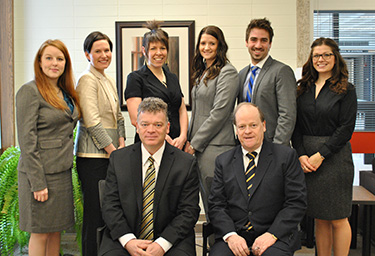
The goal for the day was to continue discussion on the two topics and identify some tangible next steps.
The bulk of the day was devoted to the discussion of the two topics of (1) integrated service centres; and (2) justice innovation and the culture of the legal profession. It became clear that there was consensus on a desire to move forward with the development of an Integrated Service Centre, which attracted support from the Ministry of Justice. There was less consensus developed around the legal culture topic, though many interesting ideas emerged for further discussion and exploration in the future.
Summary notes from the 2014 Dean’s Forum
Justice Innovation and the Culture of Legal Practice (student policy discussion paper)
Bridging the Gap: The Prospect of Integrated Service Centres (student policy discussion paper)
Photo: Student participants of the first offering of the Dean's Forum course pose with Jeff Hirsch and Justice Cromwell at the March 2014 meeting.
There was considerable interest among Forum participants in having the three focus areas further developed through some interim project work before meeting again for further discussion and planning. The College of Law recognized the potential for supporting these efforts by involving students in background research and development. Accordingly, the College of Law granted course credit to seven students committed to access to justice through a Special Topics Course called “Innovation in Justice: Dispute Resolution and Access to Justice”.
The students in the course divided into two groups to research and develop reports on the topics of (1) integrated service centres (including public information at critical gaps); and (2) justice innovation and the culture of the legal profession.
For the first meeting of the Forum, invitations were sent to those who were identified as potential decision-makers in the justice system in Saskatchewan, many of which hold high-level positions in their departments. The hope was that the membership of Forum participants would evolve as issues were explored and other voices could participate in the discussion. For the first meeting, attendees included judges from all levels of Saskatchewan Courts, members from the Ministry of Justice, the Law Society, the Saskatchewan Branch of the Canadian Bar Association, Legal Aid, and a handful of other justice-related organizations in Saskatchewan.
The goal for the first meeting of the Forum was to locate the access to justice debate within the Saskatchewan context and begin an open discussion about challenges, needs, hopes, and possibilities. By the end of the day, the group had identified three areas to focus reform efforts: (1) early integrated triage service centres; (2) public information at critical gaps; and (3) engaging practicing lawyers in a legal culture shift. Furthermore, the group decided that the Dean’s Forum should continue as a think-tank discussion forum.
Reports: Dean's Forum library
In the news
Forum seeks to find solutions to access to justice challenges in Saskatchewan (of NOTE College of Law Magazine, Fall 2014)
2014 Summary Notes posted on the National Action Committee on Access to Justice in Civil and Family Matters’ website.
Dean’s Forum explores the evolution of legal services and legal education (of NOTE College of Law Magazine, Winter 2015)
College of Law hosts fourth annual Dean’s Forum on Dispute Resolution and Access to Justice (law.usask.ca)
Recommendations from Dean’s Forum Becoming a Reality: Law Society and Ministry of Justice seeking feedback on expanding the responsibilities of non-lawyer legal service providers in Saskatchewan (Legal Sourcery Blog, May 2016)
Dean's Forum moves ahead with key recommendations (of NOTE College of Law Magazine, Spring 2016)
Putting the Public First: Saskatchewan Access to Legal Information Project (p.6 Law Society of Saskatchewan Bencher’s Digest, Winter 2016)
Inaugural Saskatchewan Access to Justice Week a success (p.6 of NOTE College of Law Magazine, Winter 2017)
Justice research centre established at the U of S (p.7 of NOTE College of Law Magazine, Winter 2017)
Cromwell named honourary fellow of CREATE Justice (p.8 of NOTE College of Law Magazine, Winter 2017)
Rural access to civil, family legal services, focus of sixth Dean’s Forum on Access to Justice and Dispute Resolution (p.6 of NOTE College of Law Magazine, Spring 2018)
Seventh meeting of the Dean’s Forum looks at diversity and tech (p.9 of NOTE College of Law Magazine, Summer 2019)
Connect with us
There are various possibilities for conversation, research, and collaborations related to improving access to justice through the Dean’s Forum initiative. We invite you to contact us at any time about:
- Access to justice topics in general
- Previous Dean’s Forum topics
- Submitting access to justice related topics for discussion at a future Dean’s Forum meeting
For more information, please contact:
Brea Lowenberger, Access to Justice Coordinator, College of Law
b.lowenberger@usask.ca
306-966-8635
@BreaLowenberger and #skdeansforum
Related publications
Brea Lowenberger, Michaela Keet & Janelle Anderson, “Collaborative Policy-Making, Law Students, and Access to Justice: The Rewards of Destabilizing Institutional Patterns” (2017) The Windsor Yearbook of Access to Justice

